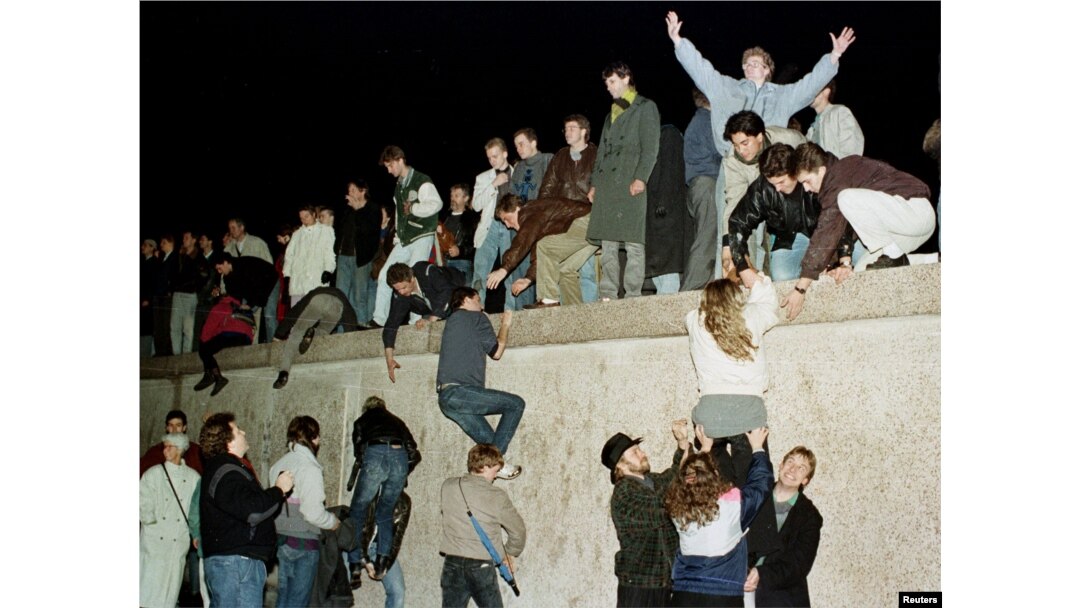Twenty-five years ago, the Soviet Union's formal dissolution marked communism's collapse in Europe and a new era of democracy, Western-style liberalism and economic growth across the region once divided by the so-called Iron Curtain.
The Soviet flag was lowered at the Kremlin for the last time on December 26, 1991, symbolizing the end of communist domination in a region that had two years earlier shaken off totalitarian governments that had been made in the image of Moscow.
Today’s Europe has a markedly different face.
“The fall of the Wall showed us that dreams can come true. Nothing has to stay as it is,” said German Chancellor Angela Merkel at a ceremony in 2014 marking the anniversary of fall of the Berlin Wall.
Nations emerging from Soviet domination were eager to shed Communist totalitarian systems and integrate into western Europe and benefit from the prosperity and access to consumer goods brought by free-market systems. Hungary, Poland, and the Czech Republic carried out aggressive privatization campaigns and political reforms, enabling them to gain entry into the European Union and NATO.
“A lot of those East European countries wanted to go West to modernity, to democracy, to liberalism, and prosperity, said Alex Pravda, a Russian and East European studies professor at the University of Oxford.

FILE - East German citizens climb the Berlin wall at the Brandenburg Gate as they celebrate the opening of the East German border in 1989.
Happened too quickly?
But Pravda, like others, wonders whether the process may have happened too quickly and notes that Soviet-era problems like corruption persist in some countries.
“Western Europe has a belt of unstable, authoritarian, security first-minded East European states, the remnants of the old Soviet empire,” he said.
Bulgaria rates as the most corrupt nation in the EU, according to Transparency International, and there are questions about Poland’s commitment to freedom of the press.
Freedom House, a U.S.-based group that advocates free institutions, in a recent report said Poland’s ruling Law and Justice Party “sparked domestic and international concern when it used its new parliamentary majority to pass a law in December that shifts control of public media from the regulatory body to the Treasury Ministry. The passage led to the immediate resignation of senior public media officials,” the report said.
But Poland’s leadership enjoys high popularity ratings as the country’s economy booms and, at one trillion dollars, makes Poland a major player in the European Union. Poles overwhelmingly voted for the Law and Justice Party, with many agreeing with its strong stance on immigration and its leaders' assertive attitude toward the European Union, which many in Poland commonly compare to the top-down approach of the Soviets. “Brussels is the new Moscow,” is a jest often heard in Warsaw and Budapest.
FILE - Flags are seen inside the European Council headquarters on the eve of a EU Summit in Brussels, Belgium.
Immigration stress
In Hungary, the government of President Viktor Orban saw its popularity jump when it ordered construction of a razor-wire fence to keep out migrants and refugees in symbolic defiance of the European Union’s calls for Hungary, along with other EU members, to accept migrant quotas.
Unlike Germany and other nations of western Europe, which for decades have accepted workers from Turkey and elsewhere, or that have drawn newcomers from former colonies around the world, countries in eastern Europe were long sealed off to immigration and are largely homogenous. The push for them to accept migrants has been socially and politically jarring.
While its former allies were adjusting to western Europe's ways, Russia, reeling from the collapse of an authoritarian system that had governed for seven decades, in the 1990’s concentrated on stabilizing itself, and not on setting foreign policy.
It was then, analysts say, that Europe had a chance to push through even bigger reforms than the ones that were carried out. But they put the blame largely on western Europe’s failure to push for deeper reforms when it had a chance to do so.
“The last 25 years in Europe have been specifically a time when the European Union had a chance, without outside threats and outside pressure, to move the EU's agenda forward,” said Gregory Weeks, a political analyst in Vienna. “Some people would say it is a missed opportunity because now we have immigration at the border, we have Russians rising again, becoming more active in international politics and putting pressure on the EU,” he said.

